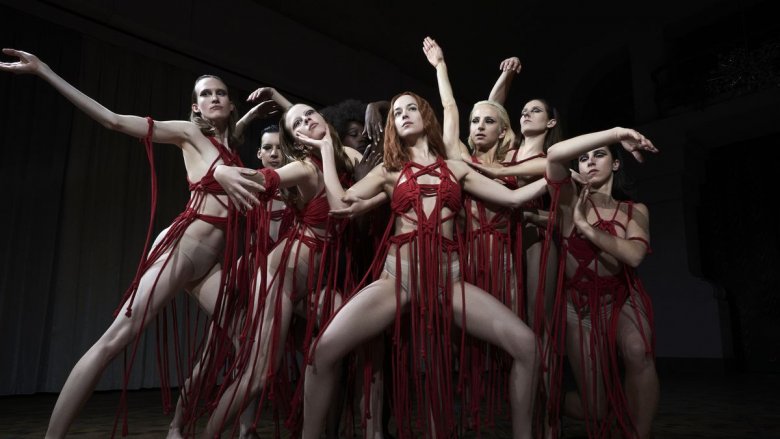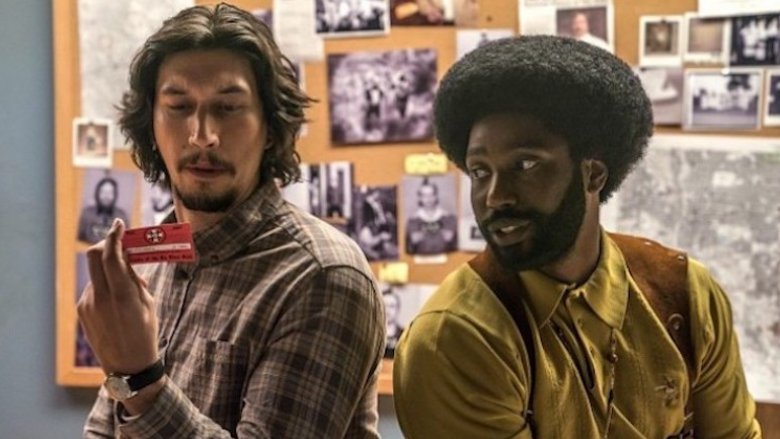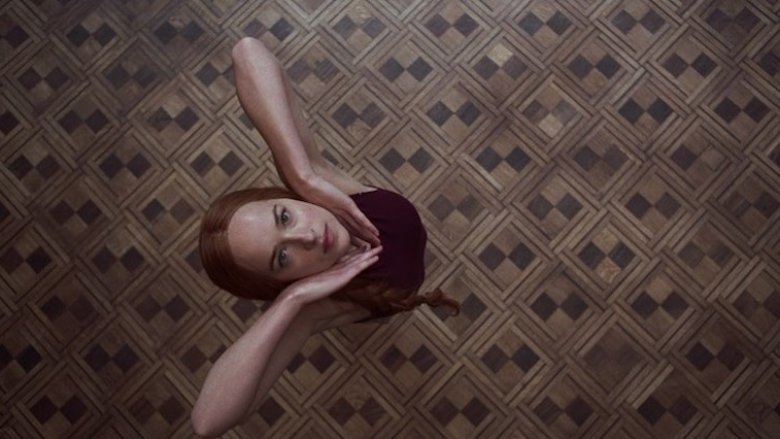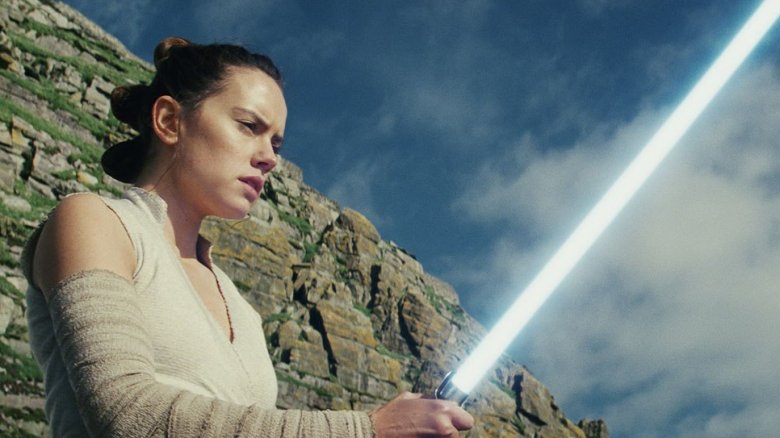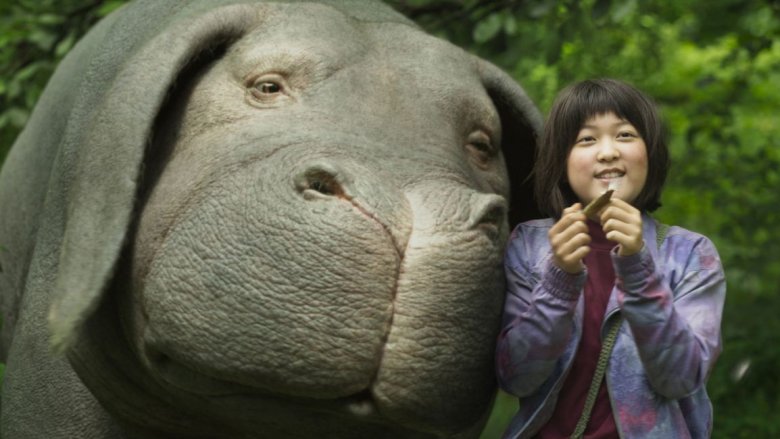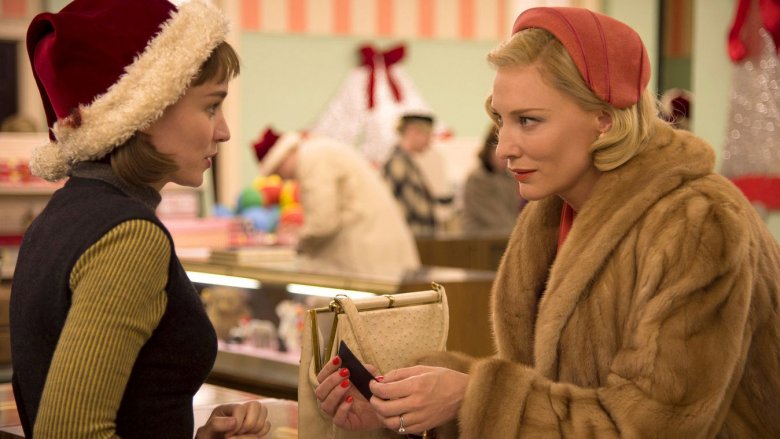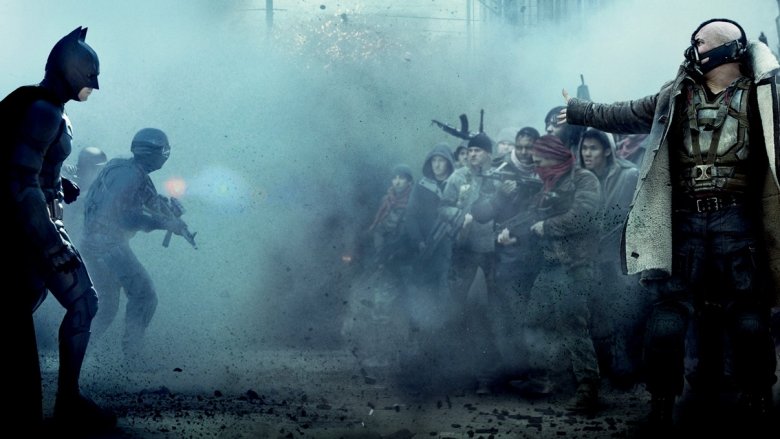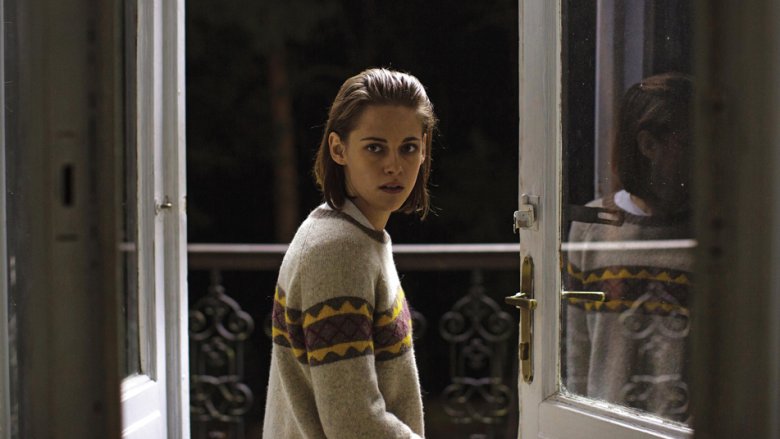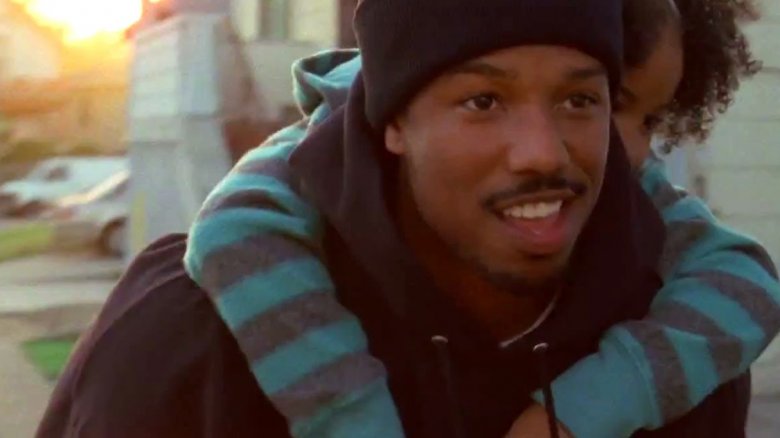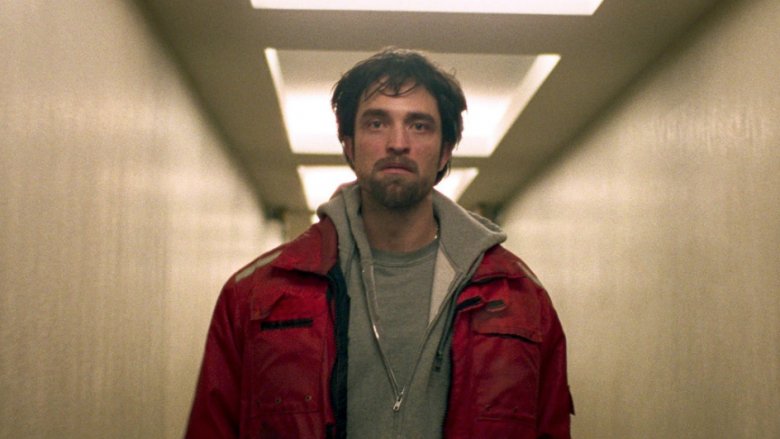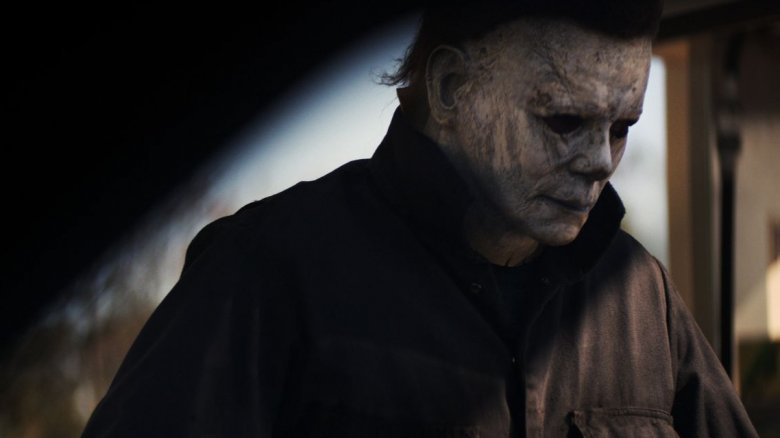Movies That Received Standing Ovations In Theaters
There are a million and one different ways to praise a movie these days. Some folks choose to post kind words on social media sites. Others take to Rotten Tomatoes to make their adoration known. Repeat viewings of a film can be a bold way to show your new favorite flick some love—though it's also the slightly more pricey option. Hey, some people even like to go old school and tell all their friends face to face just how great a movie is.
One of the more sure-fire ways to let a movie know how much you dig it is to stand right up in the theater as the credits roll for the sole purpose of whooping and wailing to your little heart's content. Of course, depending on the circumstances, the random theatrical standing ovation might make you look a little loopy, if only because such adoration is typically restricted to haughty Hollywood premieres and successful film festival screenings. Whatever the circumstance, here are a few movies that earned themselves a standing ovation while still in theaters.
BlacKkKlansman
Nearly 30 years ago, Spike Lee took the film world by storm when his uncompromising racial drama Do the Right Thing made its premiere at the Cannes Film Festival. To the shock of many, Lee's film—even then recognized as a genuine masterpiece—failed to take home the festival's top honors, the coveted Palme d'Or instead going to Steven Soderbergh's enigmatic debut feature Sex, Lies, and Videotape. Determined to leave his mark on the prestigious festival, Lee returned to the competition two years later with Jungle Fever, and again went home empty handed.
It would be 27 years before Lee took another film to Cannes in competition. Over that time, the exactingly in-your-face director proved himself as one of cinema's most gifted—if often divisive—filmmakers by releasing a steady stream of artistically ambitious and politically-themed movies. It's only natural, then, that Lee would make his Cannes return with another timely, racially-charged drama, this time in the guise of BlacKkKlansman, a daring little drama that follows the true story of an African American police officer who infiltrated the Ku Klux Klan in the 1970s. Simply put, BlacKkKlansman is a film that refuses to be ignored, and the usually stuffy Cannes crowd seemed more than happy to give the film its due, awarding BlacKkKlansman a six-minute long standing ovation, then bestowing upon it the festival's Grand Jury Prize.
Suspiria (2018)
Lee's latest opus wasn't the only film to earn a standing O at the 2018 Cannes Film Festival. The other flick to get the haughty crowd to its feet was, of all things, a remake of a horror movie. It helps, of course, that said remake is based on one of the genre's most iconic films, and that it was directed by the man behind art house hits like I Am Love, A Bigger Splash, and the Oscar-winning heartbreaker Call Me By Your Name.
The director in question is Luca Guadagnino, and the film we're talking about is his stylishly demented and utterly brilliant remake of Dario Argento's blood-spattered classic Suspiria. For the uninitiated, Argento's film followed an American dancer's arrival at a prestigious German ballet academy, and her subsequent discovery that the rash of grisly deaths plaguing the school have stranger motivations than anyone might believe.
Guadagnino wisely doesn't stray far from Argento's formula. His nightmarish Suspiria narrative again follows a dancer, a prestigious academy, and a bewitching plot driven by all manner of sexy and sadistic delights. Guadagnino does manage to twist that formula in shocking new directions, and unlike Argento, he takes his sweet time in letting that unholy tale unfold, filling in the gray areas with intriguing backstory and actual dancing, imbuing the film with a politically-charged, decidedly feminist edge. The result is an epic 150 minutes of pure horror hysterics with style, mood, and scares to burn—one that brought the Cannes crowd to their feet for nearly eight full minutes.
Star Wars: The Last Jedi
Rian Johnson's Star Wars: The Last Jedi hit theaters in the winter of 2017 behind scores of fanfare and waves of critical support. Since then, The Last Jedi has gone on to become one of the most divisive films in the storied franchise, which is more than a little surprising when you consider that middling to downright terrible offerings like The Phantom Menace and Attack of the Clones are in that mix. However you feel about Johnson's game-changing take on George Lucas' Jedi saga, it's impossible to deny that the film was made with a staggering degree of cinematic artistry and passion.
That same passion was evident at the film's glitzy premiere event at the Shrine Auditorium in Los Angeles. It was a celebration in the old-school Hollywood spirit, with the widely-publicized event playing host to costumed onlookers, life-sized reproductions of iconic Star Wars creations (including a Canto Bight-themed afterparty), and a red carpet overflowing with stars from the Star Wars universe and beyond. That sort of atmosphere lends itself to an inherent admiration towards whatever film inspired it, and you can multiply that admiration when you're talking about a new Star Wars film. As one might expect, the event's attendees were more than primed to stand up and cheer as the credits rolled on Johnson's The Last Jedi, and that's exactly what they did.
Okja
Heading into the 2017 Cannes Film Festival, relations between the legendary film fest and streaming giant Netflix were strained to say the least. At its core, the conflict was quite simple—Cannes believes in the purity of seeing movies in a cinema, and Netflix's entire approach to cinema is based on delivering movies to viewers in the comfort of their own homes. Matters only got more complicated when the streaming service's original content department started booking films by bona-fide cineastes like Noah Baumbach and Bong Joon-ho.
Names like that caused Cannes to make a couple of exceptions for the 2017 festival as films from both directors found their way into competition for the Palm d'Or. While neither film took home the top prize, both played well to the distinguished Cannes audiences. Bong Joon-ho's fantastical adventure about a young girl (Ahn Seo-hyun) risking everything to spare the life of her beloved pet "super pig" played particularly well. Not only did Okja overcome some embarrassing technical issues in its premiere, it also won over a contentious crowd to score a four-minute-long standing ovation. While the relationship between Cannes and Netflix remains problematic for both sides, we can only imagine such successful reactions—and the fact that Netflix continues to make movies with big-time filmmakers—might lead festival organizers to change their views on streaming. Here's hoping that happens sooner rather than later.
Carol
In the 70-plus years since its inception, the Cannes Film Festival has established itself as one of—if not the—most prestigious film festival in the world. It's done so by recognizing and rewarding some of the most daring movies and cinematic minds in the history of the form. Be they dramas, comedies, thrillers, or sci-fi epics, few of those films have stood quite as tall as Todd Haynes' lush, romantic indie drama Carol.
Adapted from Patricia Highsmith's groundbreaking 1952 novel The Price of Salt, Carol unfolds in New York in the 1950s, and follows an aspiring young photographer (Rooney Mara) whose blossoming romance with an older, soon-to-be divorcé (Cate Blanchett) begins to complicate and transform both of their lives. Yes, the film made its premiere at Cannes as "the Cate Blanchett lesbian drama," and yes, that title alone would seem to qualify it as a fine fit for the high-brow festival crowd. While the film makes no bones about confronting the issues facing gays in the '50s (and sadly still today), Carol ably sheds the potential stigma of its "lesbian drama" branding by presenting itself instead as a classically-styled romance that happens to feature two women.
The approach more than works. Aided by crisp writing, lavish cinematography, a hauntingly romantic original score, and career-best work from Blanchett and Mara, Haynes guides Carol with a steady, often understated hand. The unbridled romance that wafts through every frame of his wildly amorous drama as a result easily enchanted Cannes audiences, who returned the love with one of the most heartfelt ovations in Cannes history.
The Dark Knight Rises
It's rare that a blockbuster is the recipient of a standing ovation, if only because big-budget flicks tend make enough money that such egregious praise just seems silly. That logic doesn't apply to the films of Christopher Nolan. Though the esteemed director works almost exclusively among the blockbuster set these days, he does so in service of putting a heady, narratively tricky spin on the formulaic bombast of the tentpole world.
Nolan's risky approach to the blockbuster is part of what helped make the first two films in his Batman trilogy feel so fresh among their sometimes less-than-stellar superhero film contemporaries. It's also what helped make his trilogy closer The Dark Knight Rises stand out from the long shadow of its predecessor The Dark Knight.
While far less surefooted than that middle chapter, The Dark Knight Rises, with its myriad twists, characters, and side stories, often teeters on the edge of chaos for chaos' sake. But Nolan manages to reign in the anarchy in throughout, allowing TDKR to find a notable voice of its own among his Batman flicks, and even leads the film to surpass The Dark Knight in terms of cinematic scale and narrative ambition. All of this helps The Dark Knight Rises serve as a resounding exclamation mark to one of cinema's most successful trilogies, a fact not lost on attendees of the film's premiere as they stood and cheered when the credits finally rolled.
Personal Shopper
While Kristen Stewart became famous with starring roles in big budget fluff like the Twilight franchise, it's worth nothing that she built her career by starring in indie flicks like Speak, Into the Wild, Adventureland, and The Runaways. Even most of her big-budget turns have come with intriguing directors at the helm (David Fincher, Jon Favreau, and Bill Condon among them). At this point in her career, Stewart can essentially work with any filmmaker she wants, and it's clear she has more than a passing interest in working with French auteur Olivier Assayas.
The pair first collaborated on 2014's psychological drama Clouds of Sils Maria, a film many expected to take home the top prize at Cannes that year. It didn't, but Assayas enjoyed working with Stewart so much that he actually scripted his next movie with Stewart in mind.
Titled Personal Shopper, that film—an eerily muted study of loss and grief in the guise of a sexy paranormal thriller—proved the star/director collaboration to be one of the more fruitful in modern cinema. Personal Shopper made its premiere in early 2016. Not surprisingly, it did so at the Cannes Film Festival. Though the film's initial festival screening met with a slightly divisive reaction from critics, the official premiere event was quite a different scene, with the audience heaping some serious love on Stewart and Assayas. Here's hoping it was enough to get the pair to work together again soon, and as often as possible.
Fruitvale Station
After scoring back-to-back hits with the formidable one-two punch of Creed and Black Panther, Ryan Coogler has proven himself a rare director capable of making big-budget films that all but demand you stand up and cheer for them. At this point in his young career, he's probably even getting used to that reaction, as is the director's go-to actor Michael B. Jordan. As it happens, neither Creed nor Black Panther was the first of their collaborations to inspire a standing ovation.
No, that honor belongs to the film that first brought the pair together, 2013's "based on true events" drama Fruitvale Station. The "true events" in question unfold on the last day of 22-year-old Oscar Grant III's life, and lead up to his death at the hands of BART police officers in Oakland in the early hours of New Year's Day 2009. Part astutely-observed slice of life drama, and part damning examination of police brutality, Coogler's sobering film premiered at the 2013 Sundance Film Festival, ensnaring the hearts of festival audiences en route to winning a couple of the festival's top prizes that year.
Fruitvale Station's undeniable virtues were further extolled on the international stage when it made its way to the South of France, netting Coogler the Avenir Prize in the Cannes' Un Certain Regard category, which must've paired nicely with the rousing standing ovation it received in its festival screening.
Good Time
Robert Pattinson has spent the bulk of his post-Twilight years attempting to distance himself from the shimmery, schmaltzy role that made him a household name. He's done so by diving head-first into the world of indie film, scoring complex roles in under-the-radar, auteur-driven flicks like Cosmopolis, The Rover, Maps to the Stars, and The Childhood of a Leader. For the most part, he succeeded in chipping away at the teen-idol facade he procured as the oh-so-dreamy vampire Edward Cullen. However, it wasn't until Pattinson's engrossing crime thriller Good Time hit theaters that he finally blew that face to pieces.
Directed with a keen eye and propulsive energy by Josh and Benny Safdie, and propelled by a frenetic synth-heavy score from Oneohtrix Point Never, Good Time follows the fateful tale of a low-level criminal desperately attempting to raise enough money to bail his mentally-challenged brother out of jail after their attempted bank robbery goes south. Pattinson is all but unrecognizable as the skeezy lowlife at the heart of that narrative, proving to the world that he's more than capable of carrying a movie without his dashing good looks leading the way. And he proved it first on one of cinema's biggest stages to boot when the Palm d'Or-nominated Good Time premiered to a fevered standing ovation at the 2017 Cannes Film Festival.
Halloween (2018)
There was more than a little reason to worry when Danny McBride and David Gordon Green set out to "reboot" the Halloween franchise. After all, since John Carpenter unleashed his near-flawless slasher classic on the world over 40 years ago, not a single one of the franchise's seven sequels (or the two Rob Zombie-directed remakes) had managed to recapture the miraculous mirth and menace of the original. As we learned more about their film—particularly that it would ignore all of those ill-fated sequels and remakes—our fears began to subside. Then John Carpenter gave McBride's and Green's concept a thumbs-up, and even boarded the project as producer and composer. By the time Jamie Lee Curtis announced she was returning as Laurie Strode, well, those fears all but melted away.
Somehow, the odds still seemed stacked against the new Halloween living up to the original's legacy, and a semi-tense waiting game unfolded as fans counted the days until the film finally materialized. That wait came to an end when the film was announced as part of the 2018 Toronto International Film Festival lineup. Not officially in competition at TIFF, Halloween instead had its premiere at a midnight screening, playing to an eager crowd of film critics and horror enthusiasts. That crowd met the return of the Boogeyman (and a hard-edged, take no prisoners turn from Curtis) with the expected amount of glee, giving the film a gushy standing ovation and helping launch it towards a record-breaking box-office run.
